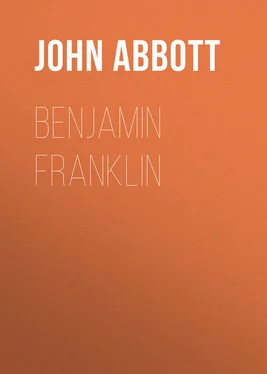John Abbott - Benjamin Franklin
Здесь есть возможность читать онлайн «John Abbott - Benjamin Franklin» — ознакомительный отрывок электронной книги совершенно бесплатно, а после прочтения отрывка купить полную версию. В некоторых случаях можно слушать аудио, скачать через торрент в формате fb2 и присутствует краткое содержание. Жанр: foreign_antique, foreign_prose, на английском языке. Описание произведения, (предисловие) а так же отзывы посетителей доступны на портале библиотеки ЛибКат.
- Название:Benjamin Franklin
- Автор:
- Жанр:
- Год:неизвестен
- ISBN:нет данных
- Рейтинг книги:3 / 5. Голосов: 1
-
Избранное:Добавить в избранное
- Отзывы:
-
Ваша оценка:
- 60
- 1
- 2
- 3
- 4
- 5
Benjamin Franklin: краткое содержание, описание и аннотация
Предлагаем к чтению аннотацию, описание, краткое содержание или предисловие (зависит от того, что написал сам автор книги «Benjamin Franklin»). Если вы не нашли необходимую информацию о книге — напишите в комментариях, мы постараемся отыскать её.
Benjamin Franklin — читать онлайн ознакомительный отрывок
Ниже представлен текст книги, разбитый по страницам. Система сохранения места последней прочитанной страницы, позволяет с удобством читать онлайн бесплатно книгу «Benjamin Franklin», без необходимости каждый раз заново искать на чём Вы остановились. Поставьте закладку, и сможете в любой момент перейти на страницу, на которой закончили чтение.
Интервал:
Закладка:
This was the remark of a boy but twelve years of age. Though it does not indicate a very devout spirit, it certainly gives evidence of an intellect of unusual acuteness.
Franklin ever spoke of his boyhood as the very happy period of a remarkably happy life. His peculiar temperament enabled him to be happy under circumstances in which others would have been very miserable. His affections in after years ever yearned toward Boston; he was accustomed to speak of it as “that beloved place.” In one of his letters to John Lathrop he wrote,
“The Boston manner, the turn of phrase, and even tone of voice and accent in pronunciation, all please and seem to revive and refresh me.”
For two years Benjamin continued to assist his father in the business of soap and candle making. He was continually looking for an opportunity to escape the drudgery of that employment and enter upon some more congenial business. Like most adventurous boys, he thought much of the romance of a sea-life. An elder brother had run away, had gone to sea, and for years had not been heard from. Benjamin’s father became very anxious as he witnessed the discontent of his son. This anxiety was increased when an elder brother married, removed to Rhode Island, and set up a soap and candle establishment for himself. This seemed to Benjamin to rivet the chains which bound him at home. Apparently his father could not spare him from the business. Thus he seemed doomed to spend the remainder of his days in employment which proved to him increasingly uncongenial.
The judicious father, apprehensive that his son might be lured secretly to embark for some distant voyage, visited with his son all the varied workshops of Boston, that he might select that trade which to him would seem most desirable. Benjamin examined all these workshops with intensest interest. He selected the employment of a cutler, and entered upon the business for a few days; but at that time a boy who was about to learn a trade was apprenticed to a master. As a premium for learning the business he usually had to pay about one hundred dollars. Then after a series of years, during which he worked for nothing, he was entitled for a time to receive journeyman’s wages. But his father, Josiah Franklin, was unable to settle satisfactorily the terms of indenture, and the cutlery trade was given up.
We have mentioned that Franklin was one of a large family of children. By the two marriages of his father, there were sixteen sons and daughters around the family hearth. One of the sons, James, had been sent to London to learn the trade of a printer. He returned to Boston and set up business on his own account, when Benjamin was eleven years of age. It was decided to bind Benjamin to this business. Reluctantly Benjamin consented to place himself in such subordination to his brother. He was, however, bound to him for a period of nine years, from twelve to twenty-one. During the last year he was to receive a journeyman’s wages. The following extract from this form of indenture of apprenticeship, which was in common use in the reign of George the First, will be read with interest.
“He shall neither buy nor sell without his master’s license. Taverns, inns, or ale-houses he shall not haunt. At cards, dice, tables, or any other unlawful game he shall not play. Matrimony he shall not contract; nor from the service of his said master day nor night absent himself, but in all things, as an honest and faithful apprentice, shall and will demean and behave himself towards his said master and all his, during said term. And the said James Franklin, the master, for and in consideration of the sum of ten pounds of lawful British money to him in hand paid by the said Josiah Franklin, the father, the receipt of which is hereby acknowledged, the said apprentice in the art of a printer which he now useth, shall teach and instruct or cause to be taught and instructed the best way and manner that he can, finding and allowing unto the said apprentice, meat, drink, washing, lodging and all other necessaries during the said term.”
Benjamin devoted himself with great assiduity to learn the trade of a printer. The office in which he worked, stood at the corner of Franklin avenue and Court street. For three years, Franklin was thus employed, apparently never seeking recreation, and never having a moment of leisure save such as he could rescue from sleep or from his meals. There were at that time several bookstores in Boston. The eminent men of that province had brought with them to the New World, literary and scientific tastes of a high order. Even then the axe of the settler had been heard but at a short distance in the primeval forests, which still encircled all the large towns. Bears were not unfrequently shot from Long Wharf, as they swam from island to island, or endeavored to cross the solitary bay. It is said that at that time twenty bears were often shot in a week.
Benjamin Franklin, inspired by his love of reading, cultivated friendly relations with the clerks in the bookstores. From them he borrowed interesting volumes, which he took home in the evening with the utmost care, and having spent most of the night in reading, would return them at an early hour in the morning, before the master of the shop had time to miss them.
Something in the demeanor of Franklin attracted the attention of a merchant in Boston by the name of Matthew Adams. He invited him to his library and loaned him books. The lad’s Uncle Benjamin, in England, who was very fond of composing rhymes which he called poetry, sent many of his effusions to his favorite nephew, and opened quite a brisk correspondence with him. Thus Benjamin soon became a fluent rhymester, and wrote sundry ballads which were sold in the streets and became quite popular. There was a great demand at that time for narratives of the exploits of pirates, the doom of murderers, and wild love adventures. It is said that one of the Boston publishers, in the sale of ballads alone, found a very lucrative business. Benjamin, who found it very easy to write doggerel verse, wrote one ballad called “The Light-house Tragedy.” It was a graphic, and what would be called at the present day, a sensational account of a shipwreck, in which the captain and his two daughters perished. He wrote another which was still more captivating, and which in all its main features was historically true. It was an account of the world-renowned pirate, Edward Teach, usually called Blackbeard. The reader will find a minute narrative of the career of that monster in the volume of this series of Pioneers and Patriots entitled “Captain Kidd; or the early American Buccaneers.” One stanza has descended to us which it is said composed a portion of this ballad, and which is certainly a fair specimen of the popular style then in vogue.
“Come all you jolly sailors
You all so stout and brave,
Come hearken and I’ll tell you,
What happened on the wave.
Oh ’tis of that bloody Blackbeard
I’m going now for to tell
And as how by gallant Maynard
He soon was sent to Hell.
With a down, down, derry down.”
This was indeed wretched stuff, as Franklin afterwards admitted; but it is to be remembered he was then but a boy of fifteen. Having composed the ballad and set in type and printed it, he was then sent to hawk it through the streets. This was certainly a remarkable achievement for a lad of his years. The eagerness with which both of the ballads were seized by the public must have greatly gratified the self-esteem of the young writer.
Addison was a bungler in talk, but every sentence from his pen was elegant. He once said, “I carry no loose change in my pocket, but I can draw for a thousand pounds.” Burke said of Goldsmith, “He writes like an angel, but he talks like poor Poll.” Franklin was by no means a bungler in his speech, but he was not fluent. He hesitated, and was at a loss for words, but whatever he wrote had a wonderful flow of harmony. The right word was always in the right place. Doubtless had he devoted as much attention to the acquirement of conversational ease, as he did to skill in writing, he would have been as successful in the one art as in the other. From early life it was his great ambition to be not merely a fine but a forcible writer. He did not seek splendor of diction, but that perspicuity, that transparency of expression which would convey the thought most directly to the mind.
Читать дальшеИнтервал:
Закладка:
Похожие книги на «Benjamin Franklin»
Представляем Вашему вниманию похожие книги на «Benjamin Franklin» списком для выбора. Мы отобрали схожую по названию и смыслу литературу в надежде предоставить читателям больше вариантов отыскать новые, интересные, ещё непрочитанные произведения.
Обсуждение, отзывы о книге «Benjamin Franklin» и просто собственные мнения читателей. Оставьте ваши комментарии, напишите, что Вы думаете о произведении, его смысле или главных героях. Укажите что конкретно понравилось, а что нет, и почему Вы так считаете.









![Benjamin Franklin - Memoirs of Benjamin Franklin; Written by Himself. [Vol. 2 of 2]](/books/747975/benjamin-franklin-memoirs-of-benjamin-franklin-wr-thumb.webp)
![Benjamin Franklin - Memoirs of Benjamin Franklin; Written by Himself. [Vol. 1 of 2]](/books/748053/benjamin-franklin-memoirs-of-benjamin-franklin-wr-thumb.webp)

